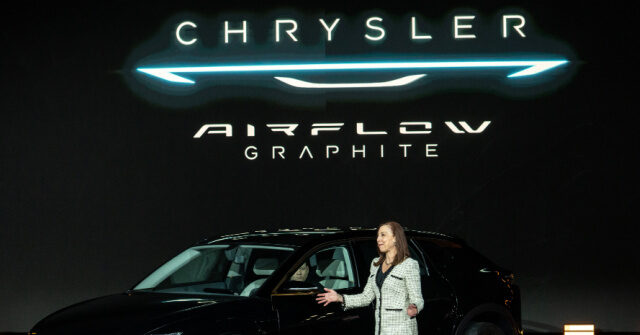Senator-elect Bernie Moreno from Ohio has signaled an ambitious initiative in the U.S. Senate aimed at compelling the foreign conglomerate Stellantis to return Chrysler to American ownership. In a recent exclusive interview with Breitbart News, Moreno, an America First Republican aligned with President-elect Donald Trump, shared his motivation for this plan following his Senate victory over outgoing Senator Sherrod Brown. Drawing from his background as an auto dealership owner, Moreno’s push for Chrysler’s repatriation is anticipated to resonate positively with autoworkers in Ohio and the broader Midwest, where economic concerns regarding job security in the auto industry are paramount.
Moreno pointed out that Chrysler, once a symbolic American company, was handed over to Fiat during Barack Obama’s presidency as part of the 2008 automobile industry bailout. He criticized the decision to transfer Chrysler’s ownership to an Italian automaker for what he described as “nothing,” and emphasized the financial success Fiat has enjoyed since, using their profits to expand into other markets, ultimately leading to the formation of Stellantis, which is now domiciled in the Netherlands. According to Moreno, this transition has effectively alienated American workers and stripped Chrysler of its American identity, as foreign executives now govern the company, exacerbating layoffs in facilities like the Toledo plant that produces Jeeps.
Expressing his commitment, Moreno plans to spearhead a movement to reclaim Chrysler from foreign control, framing Stellantis’s current management as detrimental to American jobs and industries. He articulated a vision where bringing Chrysler back under American ownership would re-establish the company’s commitment to U.S. workers and communities, contrasting sharply with the perceived indifference of multinational corporations. His commitment extends beyond Chrysler, as he aims to champion broader economic policies to revitalize American automotive manufacturing, which he terms an “Automotive Manufacturing Renaissance.”
To achieve this renaissance, Moreno has laid out a five-step strategy. The first step involves abolishing electric vehicle subsidies that, he argues, disproportionately benefit wealthy individuals, thereby burdening the taxpayer. He criticized the $7,500 federal tax credit for electric vehicles as an “obscene” government expenditure that does not prioritize American workers or manufacturers. Moreno also pointed to loopholes in recent legislation that allow affluent buyers, such as tech moguls, to benefit from these incentives regardless of their financial standing or the origin of the vehicle.
The second step in Moreno’s plan focuses on collaborating with former Representative Lee Zeldin, who is poised to lead the Environmental Protection Agency under Trump, to dismantle regulations perceived as forcing the automotive industry towards electric vehicle production. Moreno asserts that such mandates limit consumer choice and inflate prices, which he claims negatively impacts the affordability of vehicles across America. He sees sweeping regulatory reform as critical to restoring balance and fostering competitiveness in the automotive marketplace.
Moreno’s third tactic aims to curb the influence of California’s emissions standards on the national automotive landscape, arguing that such regulations are driving up vehicle costs and limiting production efficiencies. By advocating for broader standards that do not disproportionately reflect California’s stringent requirements, he argues that the automotive industry can alleviate financial pressure on consumers and streamline operations that benefit American manufacturers.
Lastly, Moreno’s plan emphasizes incentivizing car manufacturers to prioritize domestic production over outsourcing to Canada or Mexico. He suggests that a significant shift towards building vehicles in the U.S. could enhance job opportunities not only in assembly plants but also within the extensive network of suppliers and vendors linked to the automotive industry. Moreno’s holistic approach seeks to restore the prominence of American automotive manufacturing, with the overarching goal of fostering sustainable economic growth and job creation within the sector.
In conclusion, Bernie Moreno’s vision for an Automotive Manufacturing Renaissance reflects a strong commitment to reshaping the landscape of American auto production by advocating for the repatriation of Chrysler, dismissing electric vehicle subsidies, and challenging existing regulations. His plans underscore a call to action for a future where American automotive enterprises reclaim their legacy, align closely with the needs of American workers, and thrive in a global marketplace that increasingly values domestic production and innovation. As he prepares to fight for these goals in the U.S. Senate, Moreno’s strategy may inspire a renewed focus on the importance of American ownership and sovereignty in the automotive industry.

